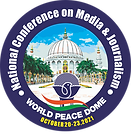SESSION UPDATES
Plenary Session 4 (International)
Emergence of India as a Global Power: An International Perspective | Plenary Session 4 (International)
The rise of India and the rise of emerging powers in general have already changed the global system. For India, this has prompted the country to adapt to a new situation in which it is playing a larger and possibly different role in the global system. In addition to this, India
has adapted its external strategies to a changing and more complex world with several economic and political power centers. The crisis unleashed by the coronavirus pandemic will almost definitely create a new global order, and India could emerge stronger. But for that, Indians will have to shed the complacency that comes from believing that the nation’s long history will make its rise inevitable. This includes, among other things, investing in a modern military, bolstering the economy, boosting partnerships with allied democracies, and strengthening India’s democratic institutions. India requires strong leadership and decisive action, not just platitudes and appeals to populism and nationalism. Decision with precision is the need of the hour.
Tuesday, 22 Sept 2020 (1.30 pm to 3.00 pm)
Shailashree Haridas - The learned speaker elaborated on the subject of the session by informing all the viewers about the story of India’s ascendancy since the 1990s. She spoke of how the reforms under erstwhile PM Mr Manmohan Singh as well as the BJP ensured that India shows strong growth which it is now manifestly evident. She did share her reservations about the strength of the Indian economy presently and of how this might impact our ambitions to become a superpower. She welcomed the participants of the session today to try and answer these questions as she is sure they can elaborate upon it better.
Venkat Narayan - The learned speaker began by stating how powerful a nation we were in history, specifically under the Mughal administration when we commanded 25 percent of the global GDP. He then goes on to state the staggering amount that was siphoned off from the nation by the British and how that number is just a symbol of the vast potential of India. He firmly believes that the only way to unlock that potential and guarantee our status as a superpower is to ensure quality education for all. This is very important considering that a third of Indian women and a fourth of Indian men are illiterate.
Manish Gupta - The learned speaker stated that he was very happy to note that there are still institutes in India that speak of such pertinent issues. He then elaborates briefly on India’s status throughout history and commends India on its growth. He remarked that the growth he witnessed in the past 3 decades has been truly amazing, but he still feels that in order for us to realise our potential we have to start imbibing technologies and processes from across the globe while also making efforts to improve our own research and development abilities. He also stated that that only sustainable development will ensure our nation’s ascendancy over the others and that this must be remembered as a central tenet to all our growth indices.
Dr Awwad - The learned speaker stated that he believes that this century will belong to Asian countries like India and China. He elaborated on the brief history of global superpowers ever since the second world war and then spoke of how, given the population and resource advantage of China and India, they will replace the present structure of nation hierarchy and become superpower. He also commended India's growth as a manufacturer and also about the fact that India is one of the biggest finished goods markets in the world. This gives India a unique advantage if he understands how to manufacture and sell goods to satisfy our own markets with the surplus going elsewhere. He then elaborated on India’s military power and the size, quality and equipment of the Indian armed forces seems satisfactory to achieve India's ambition as a superpower.
Simran Sodhi - The learned speaker took a pragmatic approach that was centered on elaborating how India is managing to ensure its influence is growing through the cementing of old alliances, as with Russia, and the building of new ones, as with the States and EU. She reiterated the hurdles in India's way, particularly overpopulation but stated that if these issues are tackled then there is no reason why India should not become the superpower that it envisions itself to be.
Vijay Naik - The learned speaker began by stating the numerous advances that India has made in the last few decades and also the numerous challenges that we face. He strove to describe the process by which India may gain ascendancy, a key component of which was the coming together of Southeast Asian nations and South Asian nations to together combat the growth of China. In this India is a natural ally of many nations that are surrounding China and given that the only real challenge to Indian ascendancy is China, it would be advisable for India to start opposing it and come up with innovative solutions such as the Non Alignment Bloc that India was the architect of. He further elaborated on the issues that India faces in its pursuit of becoming a global superpower.


